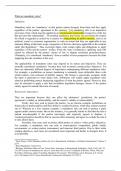What are mandatory rules?
Definition
Mandatory rules are ‘mandatory’ in that parties cannot derogate from them and they apply
regardless of the parties’ agreement to the contrary. ‘[A] mandatory rule is an imperative
provision of law which must be applied to an international relationship irrespective of the law
that governs that relationship’1. ‘Overriding mandatory provisions are provisions the respect
for which is regarded as crucial by a country for safeguarding its public interests, such as its
political, social or economic organisation, to such an extent that they are applicable to any
situation falling within their scope, irrespective of the law otherwise applicable to the contract
under this Regulation’2. Thus sovereign States wish certain rights and obligations to apply
regardless of the private parties’ wishes. From the state’s perspective, applying such rule
cannot be affected by the parties’ choice of law or dispute resolution procedure/forum.
Ultimately, it is considered ‘mandatory’ from a conflict of laws perspective because the State
supplying the rule considers it this way.
The applicability of mandatory rules may depend on its nature and objectives. They are
normally considered ‘mandatory’ because they seek to protect certain policy objectives. Yet
there are inherently different degrees of importance underpinning different mandatory rules.
For example, a prohibition on money laundering is eminently more defensible than a rule
which renders void exclusion of liability clauses. The former is universally accepted, while
the latter is particular to some States only. Arbitrators will readily apply mandatory rules
aimed at prohibiting money laundering regardless of what the parties agreed. However, they
may be reluctant to apply a rule that invalidates liquidated damages clauses if the parties
clearly agreed to include this form of remedy.
Reasons for importance
They are important because they can affect the arbitrators’ jurisdiction, the parties’
agreement’s validity or enforceability, and the award’s validity or enforceability3.
Firstly, they may seek to protect the parties. As an extreme example, prohibition on
fraud seeks to protect parties and their ability to conduct business, which they cannot contract
out of. Whereas as a less extreme example, a mandatory rule can seek to protect a party
against unfair contract terms. But in this instance, it is generally harder to find that the rule is
indeed non-derogable if the parties knowingly and expressly agreed to displace it.
Commercial parties should be able to exercise their autonomy and agree to exclude the rule if
it only affects them.
Secondly, they may seek to protect third parties or achieve wider policy objectives.
For example, a mandatory rule can seek to ensure/protect competition, public health,
environment, or weaker parties (consumers) and innocent third parties. Due to their wider
reading objectives, such rules are considered more important and harder to derogate from, if
at all possible.
1
Pierre Mayer (1986) Mandatory Rules of Law in International Arbitration, Arbitration International, Volume 2,
p274.
2
Rome Regulation, Article 9(1).
3
Blessing, Mandatory Rules of Law Versus Party Autonomy in International Arbitration, 14(4) J. Int’l Arb. 23,
24 (1997) (issues of mandatory law arise in “more than 50% of cases”); Radicati di Brozolo, When, Why and
HowMust Arbitrators Apply Overriding Mandatory Provisions?: The Problems and A Proposal, in F. Ferrari
(ed.), The Impact of EU Lawon International Commercial Arbitration 351 (2017).




